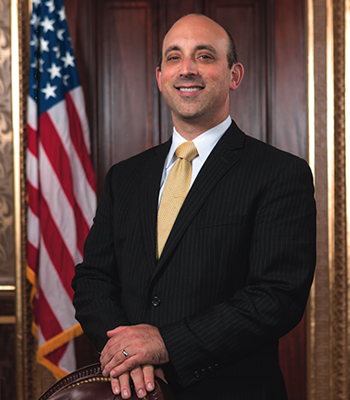The President’s man
Co-Founder of Ethos Water and Special Assistant to the President,
Jonathan Greenblatt ’99 brings social innovation to Corporate America
BY Bobby Caina Calvan | Photo by Kevin Manning

IIt started with a simple proposition: How do you turn buying a bottle of water into an act of philanthropy?
The result was Ethos Brands, a company Jonathan Greenblatt co-founded with fellow alum Peter Thum ’99 back in 2002 and sold five years later to Starbucks.
To date, Ethos has generated more than $7.3 million in grants for clean-water projects in Africa, Asia and Latin America, benefiting more than 430,000 people.
Greenblatt has turned his penchant for doing public good into a distinguished career in social entrepreneurship and public service. He served as CEO of the media company GOOD Worldwide and founded the high-tech venture All for Good. Today, he leads President Obama’s efforts to boost service and volunteerism and foster an ethic of social entrepreneurship within the country’s business community and nonprofit sector.
“The office that I head up in the White House is very focused on … how we can create change and find new ways to solve old problems in the public interest,” says Greenblatt, who runs the Office of Social Innovation and Civic Participation.
Greenblatt knows something about taking an age-old issue and finding a nontraditional solution. When they started the company back in 2002, Greenblatt and Thum leveraged their marketing acumen to build a brand designed to improve access to clean water in overseas communities.
“I think it’s fair to say that Ethos helped to contribute to the broader understanding and awareness across the United States of the world water crisis,” Greenblatt says. “It was less understood when we launched, but today I think it’s a much higher-profile issue. I’d like to think that we had some role in increasing awareness.”
While statistics on the prevalence of social entrepreneurship are hard to come by, Greenblatt asserts that the sector is growing. “Increasingly today, business people understand that in order to make it in the marketplace, you’ve got to deliver value in the long term, and that’s value on a holistic level,” he said.
In his role at the White House, Greenblatt leads the administration’s efforts to use financial innovation to increase capital flows to businesses, nonprofits and social enterprises through new models such as innovation funds and “social impact bonds.” One such effort, the $300 million “Pay For Success” fund Obama announced earlier this year, incentivizes private investors to fund preventive programs that tackle some of the country’s most vexing social problems, such as reducing recidivism.
When targets are met, investors can earn a return on their money and government enjoys the savings created by successful programs.
In the end, Greenblatt says, “We’re using capital to create stronger communities.”


